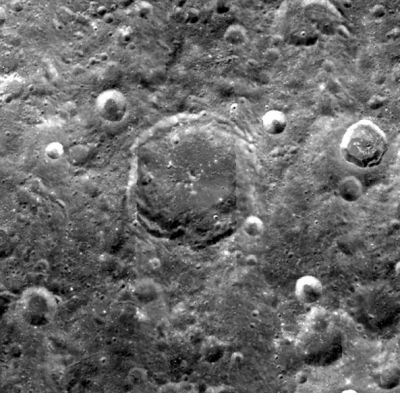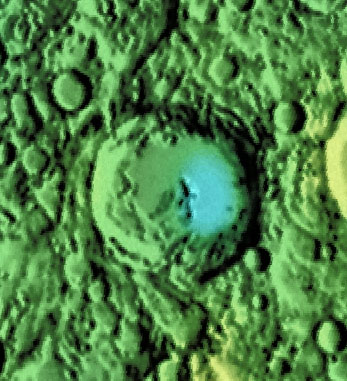Difference between revisions of "Bridgman"
(Created page with "<div id="content_view" class="wiki" style="display: block"> =Bridgman= {| class="wiki_table" | Lat: 43.5°N, Long: 137.1°E, Diam: 80 km, Depth: km, Rükl: ''(farside)''<br...") |
|||
| (3 intermediate revisions by the same user not shown) | |||
| Line 5: | Line 5: | ||
|- | |- | ||
| | | | ||
| − | [http://lpod.org/coppermine/displayimage.php?pid=4209&fullsize=1 [[Image: | + | [http://lpod.org/coppermine/displayimage.php?pid=4209&fullsize=1 [[Image:Normal_bridgman-large.jpg|external image normal_bridgman-large.jpg]]]<br /> |
| | | | ||
| − | [[Image: | + | [[Image:Bridgman-color.jpg|bridgman-color.jpg]]<br /> |
|} | |} | ||
| − | '''Left:''' [http://pdsmaps.wr.usgs.gov/explorer-bin/mapmars4.cgi?WHEREFROM=PZ&VERSION=INTERMEDIATE&DATA_SET_NAME=moon_clementine_bw&PIXEL_TYPE=BIT8&SCALE=pixels/degree&PROJECTION=SINUSOIDAL&RESOLUTION=64&RESAMP_METHOD=NEAREST_NEIGHBOR&BANDS_SELECTED=&FORMAT=JPEG&LONBOX=16&LATBOX=16&GRIDLINE_FREQUENCY=none&STRETCH=NONE&LAT=41.5&LON=136&LINE=1024&SAMP=812 Clementine] image from [http://pdsmaps.wr.usgs.gov/PDS/public/explorer/html/lidrintm.htm PDS Map-A-Planet]. '''Right:''' [http://planetarynames.wr.usgs.gov/images/Lunar/lac_31.pdf Color-coded Lac 31] from [ | + | '''Left:''' [http://pdsmaps.wr.usgs.gov/explorer-bin/mapmars4.cgi?WHEREFROM=PZ&VERSION=INTERMEDIATE&DATA_SET_NAME=moon_clementine_bw&PIXEL_TYPE=BIT8&SCALE=pixels/degree&PROJECTION=SINUSOIDAL&RESOLUTION=64&RESAMP_METHOD=NEAREST_NEIGHBOR&BANDS_SELECTED=&FORMAT=JPEG&LONBOX=16&LATBOX=16&GRIDLINE_FREQUENCY=none&STRETCH=NONE&LAT=41.5&LON=136&LINE=1024&SAMP=812 Clementine] image from [http://pdsmaps.wr.usgs.gov/PDS/public/explorer/html/lidrintm.htm PDS Map-A-Planet]. '''Right:''' [http://planetarynames.wr.usgs.gov/images/Lunar/lac_31.pdf Color-coded Lac 31] from [[USGS%20Digital%20Atlas|USGS Digital Atlas]]<br /> <div id="toc"> |
| − | + | ||
| − | |||
==Images== | ==Images== | ||
| − | [http://www.lpod.org/coppermine/thumbnails.php?album=search&type=full&search=Bridgman LPOD Photo Gallery] [http://www.lpi.usra.edu/resources/lunar_orbiter/bin/srch_nam.shtml?Bridgman%7C0 Lunar Orbiter Images] [http://www.lpi.usra.edu/resources/apollo/search/feature/?feature=Bridgman Apollo Images]<br /> - According to '''NUNKI''', a frequent visitor of the LPOD site, the crater '''Bridgman''' was captured on Apollo 13's ''Hasselblads'' [http://www.lpi.usra.edu/resources/apollo/frame/?AS13-60-8657 AS13-60-8657] and [http://www.lpi.usra.edu/resources/apollo/frame/?AS13-60-8666 AS13-60-8666]. In the first frame, '''Bridgman''' should be the crater at bottom center. In the second frame, '''Bridgman''' should be the crater at center. <span class="membersnap">- | + | [http://www.lpod.org/coppermine/thumbnails.php?album=search&type=full&search=Bridgman LPOD Photo Gallery] [http://www.lpi.usra.edu/resources/lunar_orbiter/bin/srch_nam.shtml?Bridgman%7C0 Lunar Orbiter Images] [http://www.lpi.usra.edu/resources/apollo/search/feature/?feature=Bridgman Apollo Images]<br /> - According to '''NUNKI''', a frequent visitor of the LPOD site, the crater '''Bridgman''' was captured on Apollo 13's ''Hasselblads'' [http://www.lpi.usra.edu/resources/apollo/frame/?AS13-60-8657 AS13-60-8657] and [http://www.lpi.usra.edu/resources/apollo/frame/?AS13-60-8666 AS13-60-8666]. In the first frame, '''Bridgman''' should be the crater at bottom center. In the second frame, '''Bridgman''' should be the crater at center. <span class="membersnap">- DannyCaes <small>Feb 6, 2011</small></span><br /> <br /> |
==Maps== | ==Maps== | ||
| − | ''([ | + | ''([[LAC%20zone|LAC zone]] 31A3)'' [http://planetarynames.wr.usgs.gov/images/Lunar/lac_31.pdf USGS Digital Atlas PDF]<br /> <br /> |
==Description== | ==Description== | ||
| − | '''Bridgman''' is a crater of the [ | + | '''Bridgman''' is a crater of the [[Stratigraphy|Nectarian]] period (~ 3.92 to 3.85 bn years). As it lies some 600 kilometres north-west of the [[South%20Pole-Aitken%20Basin|Moscoviense Basin]] -- a 420 kilometre-wide basin of the same period, some ejecta deposits may lie mixed within the crater, or, perhaps, on it. The outer rim of '''Bridgman''' looks relatively sharp for its age, but several landlides have occurred all around forming the obvious-looking terraces. The southern section of these terraces seems to have expierenced some further division in their formation as the eastern section is much more broader in its extent than that of the west side. Would this be due to the already-above-mentioned '''Moscoviense Basin''' event, or the [[Mare%20Humboldtianum|Humboltianum Basin]] just north-west of '''Bridgman''' that also occurred at the same time? The floor of '''Bridgman''' looks relatively flat, and a small series of peaks in its centre make up what was once a prominant peak.<span style="font-family: Arial"><span class="membersnap">- JohnMoore2</span></span><br /> <br /> |
==Description: Wikipedia== | ==Description: Wikipedia== | ||
[http://en.wikipedia.org/wiki/Bridgman_(crater) Bridgman]<br /> <br /> | [http://en.wikipedia.org/wiki/Bridgman_(crater) Bridgman]<br /> <br /> | ||
==Additional Information== | ==Additional Information== | ||
| − | [ | + | [[Central%20peak%20composition|Central peak composition]]: Anorthosite & GNTA1 ([[Tompkins%20%26%20Pieters%2C%201999|Tompkins & Pieters, 1999]])<br /> <br /> |
==Nomenclature== | ==Nomenclature== | ||
Percy Williams Bridgman; American physicist; Nobel laureate (1882-1961).<br /> <br /> | Percy Williams Bridgman; American physicist; Nobel laureate (1882-1961).<br /> <br /> | ||
| Line 29: | Line 28: | ||
<br /> <br /> | <br /> <br /> | ||
---- | ---- | ||
| − | + | </div> | |
Latest revision as of 20:03, 16 April 2018
Contents
Bridgman
| Lat: 43.5°N, Long: 137.1°E, Diam: 80 km, Depth: km, Rükl: (farside) | |
Images
LPOD Photo Gallery Lunar Orbiter Images Apollo Images
- According to NUNKI, a frequent visitor of the LPOD site, the crater Bridgman was captured on Apollo 13's Hasselblads AS13-60-8657 and AS13-60-8666. In the first frame, Bridgman should be the crater at bottom center. In the second frame, Bridgman should be the crater at center. - DannyCaes Feb 6, 2011
Maps
(LAC zone 31A3) USGS Digital Atlas PDF
Description
Bridgman is a crater of the Nectarian period (~ 3.92 to 3.85 bn years). As it lies some 600 kilometres north-west of the Moscoviense Basin -- a 420 kilometre-wide basin of the same period, some ejecta deposits may lie mixed within the crater, or, perhaps, on it. The outer rim of Bridgman looks relatively sharp for its age, but several landlides have occurred all around forming the obvious-looking terraces. The southern section of these terraces seems to have expierenced some further division in their formation as the eastern section is much more broader in its extent than that of the west side. Would this be due to the already-above-mentioned Moscoviense Basin event, or the Humboltianum Basin just north-west of Bridgman that also occurred at the same time? The floor of Bridgman looks relatively flat, and a small series of peaks in its centre make up what was once a prominant peak.- JohnMoore2
Description: Wikipedia
Additional Information
Central peak composition: Anorthosite & GNTA1 (Tompkins & Pieters, 1999)
Nomenclature
Percy Williams Bridgman; American physicist; Nobel laureate (1882-1961).
LPOD Articles
Bibliography

